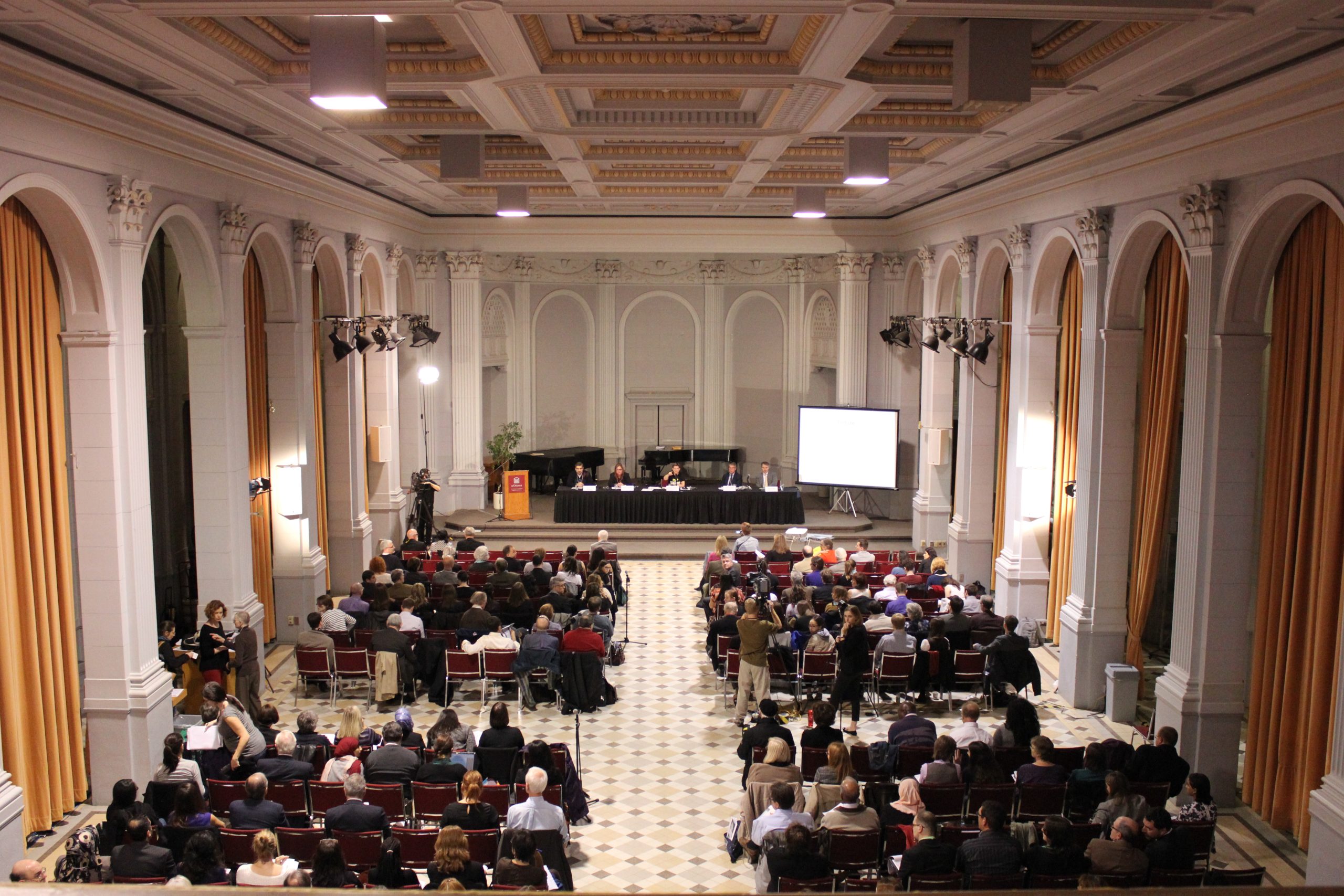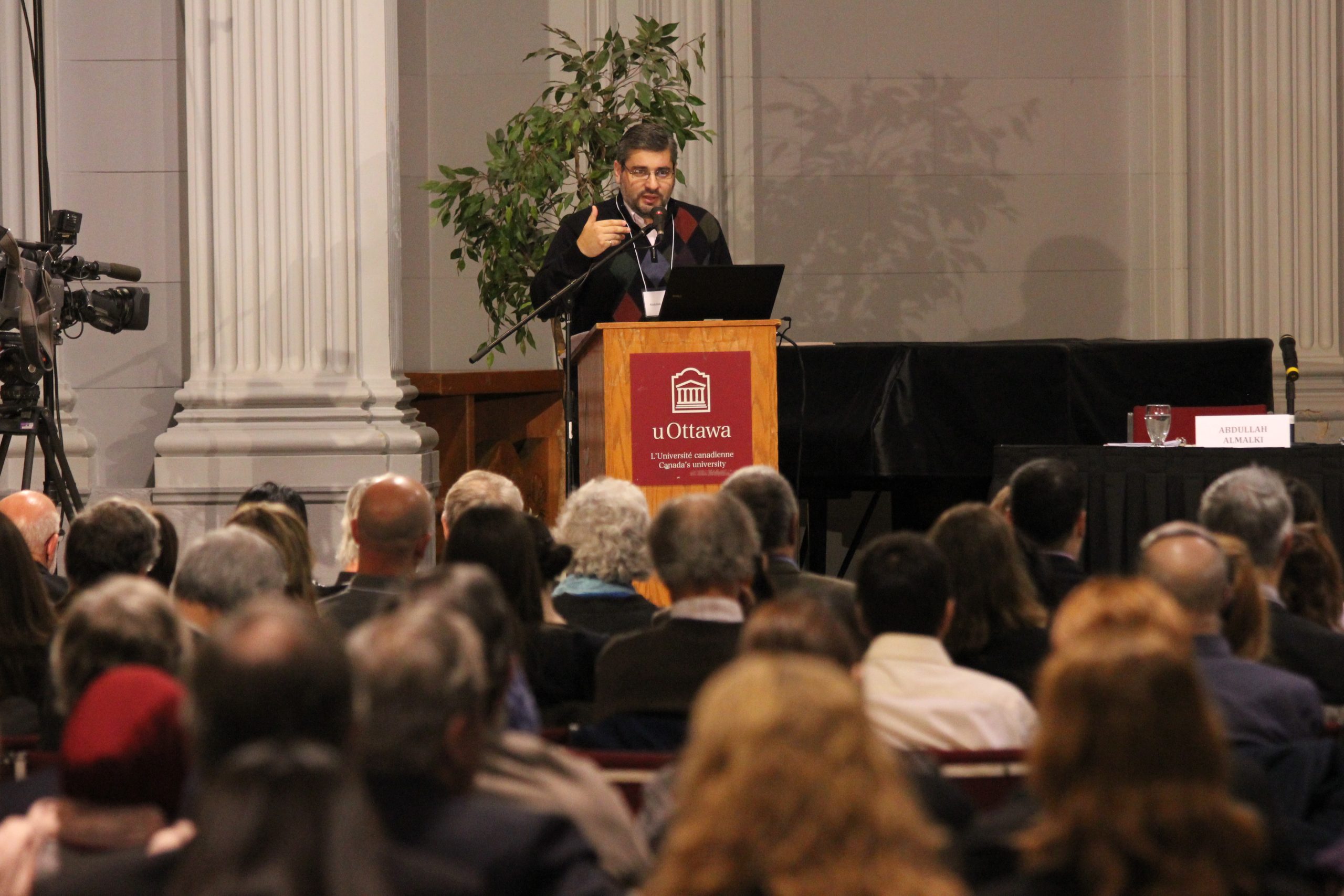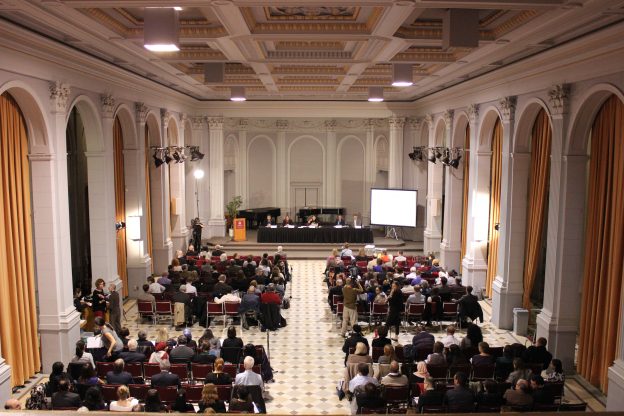
Arar+10 conference, uOttawa. ICLMG/Sebastian Packer
This essay is part of ICLMG’s new 20th anniversary publication, Defending Civil Liberties in an Age of Counter-terrorism and National Security. Join us for the online launch on Sept. 11, 2024, at 7pm ET. Click here for more information and to register.
By Roch Tassé
In the aftermath of the September 11, 2001 attacks, the United States, and Canada under pressure from its neighbour, rushed into the adoption of a series of anti-terrorism laws and other counter-terrorism measures, notably in the area of border control, air transportation and terrorist listing. That opened the door for the unprecedented deployment of surveillance technologies and data collection on individuals, and enabled practices of social sorting and profiling, virtually putting an end to privacy protection regimes until then viewed as a fundamental right in so-called democracies.
The International Civil Liberties Monitoring Group (ICLMG) was born out of concerns about the impacts of these laws and measures on civil liberties, human rights, refugee protection, international humanitarian law, racial justice, political dissent and the justice system.
The coalition was created in May 2002, six months after the adoption of Canada’s Anti‑terrorism Act (ATA) in 2001 to serve as a forum for information-sharing, collective action and the development of common policy positions to protect the rule of law, civil liberties and human rights from attacks in the name of national security. It brought together international development and humanitarian NGOs, unions, professional associations, faith groups, environmental organizations, human rights and civil liberties advocates, as well as groups representing immigrant and refugee communities in Canada.
A central focus of our work was to analyze legislation, monitor its application and document the impacts of the so- called ‘War on Terror’ with a view to intervening during the parliamentary review of the ATA scheduled to take place five years after its adoption.
To carry this out, we proactively developed collaborations and alliances with international counterparts. Domestically, we reached out to other civil liberties groups, grassroots organizations, and collaborators in the legal and academic communities. Nurturing relationships and building networks became a feature of the ICLMG’s work in the many campaigns waged over the next 20 years. And throughout our journey we ended up collaborating with some of the best and most committed activists, researchers, jurists and human rights lawyers in Canada.
Very early on, we also engaged with policy makers and the press, and soon became a credible voice on the Hill. The ICLMG appeared before numerous parliamentary committees over the years and has been present in the country’s mainstream media to this day.
But while immersed in research and policy work, we were soon confronted with the human face of anti-terrorism, which drove our agenda for the next 20 years.
In the fall of 2002, we were introduced to Monia Mazigh during a meeting at Amnesty International Canada. The CIA had disappeared her husband and sent him to Syria where he was being tortured under the US rendition program. The case of Maher Arar revealed and confirmed the existence of this infamous program. Over the next year, the ICLMG and its members supported Monia in a relentless campaign for his repatriation, against efforts by CSIS and the RCMP to block his return to Canada.
Then, in December 2002, a security certificate was issued against Mohamed Harkat. His case, along with that of four other men, marked the beginning of many of the ICLMG’s interventions on the issue of ‘secret trials’ and deportation to torture. These and more individual cases will be discussed in the following texts.
2004: The O’Connor Commission
Following the return of Maher Arar to Canada, in the fall of 2003, the ICLMG lobbied and mobilized support for a public inquiry into the events leading to his rendition. In January
2004, the Liberal government established a Commission of Inquiry to look into the actions of Canadian officials in connection with the Arar case. Presided by Justice Denis O’Connor, the Commission was also mandated to make recommendations with respect to oversight and review of the RCMP’s national security activities.
The ICLMG was granted intervener status by the Commission and for the next two years we monitored the entire process, attending almost all of the hearings. During the proceedings, the ICLMG was invited by Justice O’Connor to participate in a roundtable discussion on oversight and review of national security operations. In their final submission to the Commission, our lawyers, Warren Allmand and Me Denis Barrette, proposed a detailed model for a complaint and review mechanism.
In its final report in September 2006, the Commission exonerated Maher Arar and found that Canadian officials had given the United States false information about him. Justice O’Connor also recommended the creation of an integrated oversight and complaint mechanism for all Canadian intelligence and security agencies. The model recommended differed from the one put forward by the ICLMG, but incorporated many of its elements.
2007: The Iacobucci Commission
During the course of the Arar Inquiry, we found out that three other Canadian men, Abdullah Almalki, Ahmad Abou- Elmaati and Muayed Nureddin, had also been detained and tortured in Syria and Egypt with the complicity of Canadian officials. The ICLMG and the group of friendly interveners submitted a recommendation to Justice O’Connor for the creation of a second inquiry into these cases, which he included in his final report.
As a result, the government established the Iacobucci Inquiry in 2007 to review the nature of Canadian intelligence-sharing with other countries, including the US, Syria and Egypt. The Commission also sought to determine if Canadian officials were complicit in the alleged abuse.
Once again the ICLMG sought and obtained intervener status, but much of the work of the Commission was behind closed doors with few opportunities to intervene. Nevertheless Justice Iacobucci concluded that while the Canadian government was not directly responsible for the torture of Almalki, Elmaati and Nureddin, their mistreatment arose indirectly from the actions of Canadian officials, likely as a result of erroneous information-sharing.
2009: Motion in support of O’Connor recommendations presented in the House of Commons
Following the two inquiries, the ICLMG and Amnesty International Canada played a lead role in lobbying MPs to support the implementation of the O’Connor recommendations. In December 2009, all members of Parliament, with the exception of Conservative MPs, voted in favour of a motion in support of these recommendations. The motion also called for the government to apologize to Abdullah Almalki, Ahmad Abou-Elmaati and Muayyed Nureddin. The Conservative government chose to ignore the O’Connor recommendations and the men had to wait until
2017 to receive an apology.

Abdullah Almalki speaking at the Arar+10 conference, uOttawa. ICLMG/Sebastien Packer
2014: The Arar+10 Conference
We persevered. In 2014, in collaboration with Amnesty International Canada and the University of Ottawa Human Rights Research and Education Centre, the ICLMG organized a high profile symposium to mark the 10th anniversary of the Arar Inquiry. The event reunited key actors of the commissions, including Justices O’Connor and Iacobucci, as well as Justice Major who had presided over the Inquiry into the Air India bombing. The three justices discussed the state of national security and human rights, and the implementation – or lack thereof – of the recommendations they had made to prevent human rights abuses from happening again.
Held in the aftermath of the October 12 shooting on Parliament Hill, the event generated huge media coverage and revived public attention on the need for oversight as the Harper government was getting ready to grant yet more powers to national security agencies with the introduction of Bill C-51, the Anti‑terrorism Act of 2015.
It took another five years for the Liberal government, following a national consultation during which the ICLMG’s members contributed significant input, to finally establish the National Security and Intelligence Review Agency (NSIRA) in June 2019 as part of Bill C-59; a failed attempt to ‘fix’ Bill C-51. The agency is an overarching review body that can examine all Canadian national security activities, regardless of agencies or departments, pretty much along the lines of the model put forward by the ICLMG, at the O’Connor Commission, 13 years before.
A chapter that started the day we met Monia Mazigh in 2002 was finally closed. But it was far from the last chapter in the ICLMG’s story.
Roch Tassé is a human rights and social justice activist, and past National Coordinator of ICLMG.
Since you’re here…… we have a small favour to ask. Here at ICLMG, we are working very hard to protect and promote human rights and civil liberties in the context of the so-called “war on terror” in Canada. We do not receive any financial support from any federal, provincial or municipal governments or political parties. You can become our patron on Patreon and get rewards in exchange for your support. You can give as little as $1/month (that’s only $12/year!) and you can unsubscribe at any time. Any donations will go a long way to support our work. |



